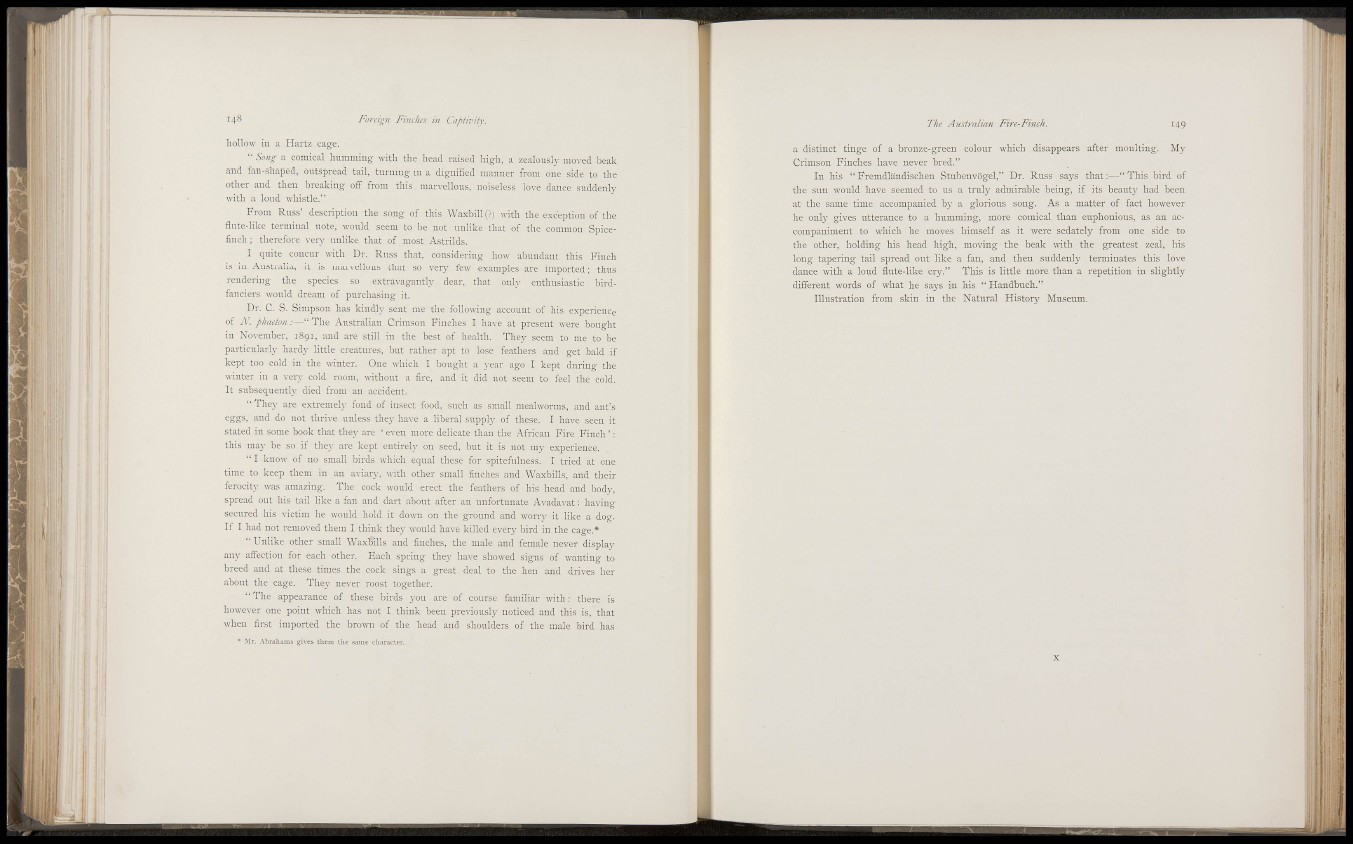
Fmrign Findiis in Ca/itivity.
liollow ill a Hartz cage.
" Song a comical limiiming with the head raised high, a zealouslj- moved beak
and fan-shaped, outspread tail, turning in a dignified manner from one side to the
other and then breaking off from this njarvellons, noiseless love dance suddenlywith
a loud whistle."
From Rnss' description the song of this Waxbill(?) with the exception of the
flute-like terminal note, would seem to be not unlike that of the common Spicefinch
; therefore very unlike that of most Astrilds.
I quite concur with Dr. Russ that, considering how abundant this Pinch
is in Australia, it is marvellous that so ver}- few examples are imported; thus
rendering the species so extravagantly dear, that onlv enthusiastic birdfanciers
would dream of purchasing it.
Dr. C. S. Simpson has kindh' sent me the following account of his experience
of phadon :—"The Australian Crimson Finches I have at present were bought
in November, 1891, and are still iii the best of health. They seem to me to be
particularly hardy little creatures, but rather apt to lose feathers and get bald if
kept too cold in the winter. One which I bought a ^^ear ago I kept during the
winter in a very cold room, without a fire, and it did not seem to feel the cold.
It subsequently died from an accident.
" T h e y are extremely fond of insect food, such as small mealworms, aud ant's
eggs, and do not thrive unless thev have a liberal supply of these. I have seen it
stated in some book that the}' are ' even more delicate than the African Fire Finch ' :
this ma}' be so if the}- are kept entirel}' on seed, but it is not my experience.
" I know^ of no small birds which equal these for spitefulness. I tried at one
time to keep them in an aviar}', with other small finches aud Waxbills, and their
ferocit}' was amazing. The cock would erect the feathers of his head aud body,
spread out his tail like a fan and dart about after an unfortunate Avadavat: having
secured his victim he would hold it down on the ground and worr}' it like a dog.
If I had not removed them I think they would have killed every bird in the cage.*
" Unlike other small Waxbills and finches, the male and female never display
any aifection for each other. Each spring they have showed signs of wanting to
breed and at these times the cock sings a great deal to the hen and drives her
about tire cage. The}' never roost together.
" T h e appearance of these birds }'0U are of course familiar with: there is
howe\-er one point which has not I think been previously noticed and this is, that
when first imported the bro\\'n of the head and shoulders of the male bird has
* Mr. .\brahaiiis tlieni tlie .same cliaracti^r.
The Australian Fire-Finch. 149
a distinct tinge of a bronze-green colour which disappears after moulting. My
Crimson Finches have never bred."
In his "Fremdländischen Stubenvögel," Dr. Russ says that:—"This bird of
the sun would have seemed to us a truly admirable being, if its beauty had been
at the same time accompanied by a glorious song. As a matter of fact however
he only gives utterance to a humming, more comical than euphonious, as an accompaniment
to which he moves himself as it were sedately from one side to
the other, holding his head high, moving the beak with the greatest zeal, his
long tapering tail spread out like a fan, and then suddenly terminates this love
dance with a loud iiute-like cry." This is little more than a repetition in slightly
diiFerent words of what he says in his " Handbuch."
Illustration from skin in the Natural Historj' Museum.
. • I 1-
! i;